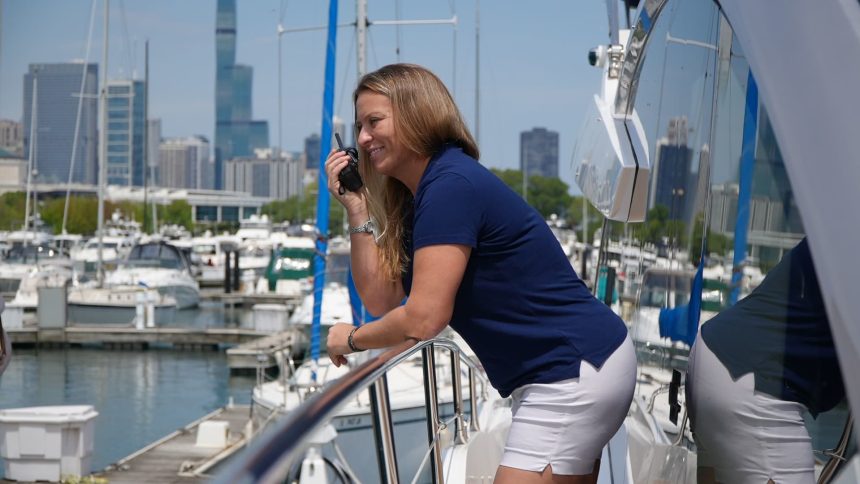This story is part of CNBC Make It’s Six-Figure Side Hustle series, where people with lucrative side hustles break down the routines and habits they’ve used to make money on top of their full-time jobs. Got a story to tell? Let us know! Email us at [email protected].
Kelly Gordon used to avoid social media. Now, her side hustle depends on it.
The 42-year-old Indiana native is a full-time superyacht captain for “ultra-high net worth” people, she says, currently helming a client’s 108-foot boat based in Palm Beach, Florida. She joined Facebook and Instagram in 2019, only to keep in touch with her two siblings.
She posted videos about her day-to-day life — travels, boating tips, mental health — and was surprised to see them gain popularity among users she didn’t know. Traction led to monetization opportunities: The business of Captain Kelly J. Gordon brought in $124,000 in revenue last year, according to documents reviewed by CNBC Make It.
That money comes from advertising payouts, sponsorships, public speaking gigs and merchandise sales. Most of it goes toward paying a PR manager, video editor and three other part-time employees, says Gordon.
DON’T MISS: The ultimate guide to earning passive income online
She spends about five hours per week on her side hustle, or whenever she’s not actively captaining, she says. Her goal is start paying herself an income from it next year.
“I’m hoping this will be my retirement job … traveling around the world, showing up at events, inspiring people and continuing with my social media,” Gordon told Make It last week, adding: “I’m not done running boats anytime soon.”
Here, Gordon discusses combining her array of life experiences into one side hustle, why she outsources tasks instead of pocketing revenue from the beginning and how she sets healthy boundaries.
CNBC Make It: Do you think your side hustle is replicable?
Gordon: One thousand percent. If you can be authentic, it’s the easiest, simplest, thing to do. If you’re not comfortable with yourself, it can be the hardest.
People have told me they love my content because it’s so genuine. I’m not trying to be someone I’m not.
Gordon in Compass Cay in the Bahamas
Kelly Gordon
For me, that took a lot of getting real with myself and doing a lot of introspective work. Some of that also comes with age. Over time, you can learn how to love yourself and be comfortable in your own skin.
It’s hard to be comfortable with yourself, let alone put it out there for the whole entire universe.
How much does it cost to start a side hustle on social media?
You don’t [have to make a financial investment]. I started off just posting myself, before I quickly laughed at myself and decided to hire some help.
Let’s say you get to the point where you want to spend a $100 a month on social media, and you think to yourself, “Well, I don’t have extra money to spend.”
Yes, you do. It could be not going to Starbucks every day, or not taking a Saturday shopping trip. You might have the money in savings. You have to realize that you can’t do everything.
A lot of your earnings go toward paying other people, instead of your own bank account. Why did you make that decision?
I’m not a videographer. I’m not an editor. I’m a boat captain.
That means I only have so much time for this side hustle when I’m not on the water. Plus, I’m smart enough to realize [editing] videos is not my strong suit.
Gordon filming social media content.
Courtesy of Kelly Gordon
My strong suit is to get in front of the camera and talk about stuff, to be bubbly and educational and inspirational. The money comes in when I produce good content, but I need a team to help me do that.
At this stage in the game, I’m pouring every little thing right back in to build the business.
What’s your advice for someone who wants to start a side hustle or change careers, but doesn’t think they have relevant experience?
I hear young people who want to become [yacht] crew members all the time say, “I don’t have any experience.” And I’m like, “Yes, you do.” I don’t care what you’ve done in your past. Something will relate.
My chemistry background relates to my yachting career in two ways. The chemistry applies in a very mechanical sense. And if I can lead a classroom of hundreds of students, I can lead a boat with a crew.
My extra time has always been on mental health and education, so it was naturally easy for me to create content [about those topics]. Think about where you spend a majority of your free time.
How do you balance your side hustle with your full-time job in a sustainable way?
The conversations in our heads are the most important ones.
I’ve learned to notice when I’m about to burn out. Then I give myself a break. Self-talk is also huge. That’s when you start beating yourself up and telling yourself, you can’t do it, you’re [not good enough], and the thought just gets stuck on a loop.
I do two things when I’m beating myself up. I visualize an old projector tape that’s going round and round, and I picture myself cutting the tape. Then, I think to myself, “Would you say these things to your own best friend?” If the answer is no, then I stop.
As I grow the social media and public speaking parts of my business, I’m sure there eventually will be a hater or two. Even though I’ve worked so hard to accept when people don’t like me, I’m still human. It’s still going to hurt. I’m actively preparing myself for that.
This interview has been edited for length and clarity.
Want to make extra money outside of your day job? Sign up for CNBC’s new online course How to Earn Passive Income Online to learn about common passive income streams, tips to get started and real-life success stories. CNBC Make It readers can use special discount code CNBC40 to get 40% off through August 15, 2024.
Read the full article here




